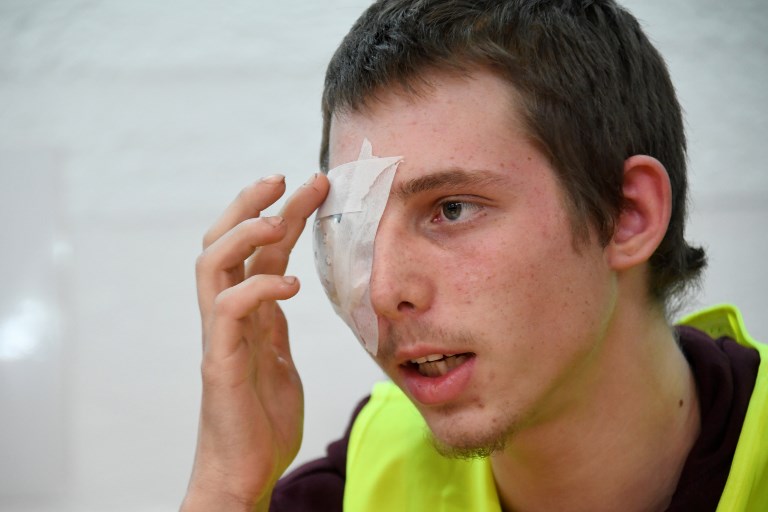
by Clare BYRNE
Agence France Presse
PARIS, France (AFP) — A rights group and a major trade union went to France’s top administrative court Wednesday seeking a ban on riot police using rubber bullets, blamed for injuring dozens of “yellow vest” protesters.
Activists have denounced the police for their use of the projectiles during two months of anti-government protests, which have repeatedly ended in rioting.
A government spokesman told the court that police had opened 111 investigations into incidents surrounding their use at the protests.
In the National Assembly meanwhile, MPs approved measures to ban habitual troublemakers from the demonstrations.
Dozens of people have been seriously injured in clashes with police, including several who have been blinded. Protesters, rights groups and some sections of the French media have blamed some of the more serious injuries on the 40-mm (1.6-inch) rubber projectiles.
The Human Rights League (LDH) and the left-wing CGT union lodged a case at the Council of State, the country’s highest administrative court, after a lower administrative court rejected their petition last week.
Rubber bullets are prohibited for use in riot control in most western European countries.
The Desarmons-Les (Disarm Them) collective, which campaigns against police violence, claims 20 protesters have lost an eye.
111 police investigations
The government has defended the police use of both rubber bullets and stun grenades as necessary to guard against violent elements among the yellow vests activists who have repeatedly attacked security forces.
An interior ministry spokesman told the Council of State Wednesday the weapon had been used 9,228 times during the yellow jacket protests.
And out of those cases, the General Inspectorate of the National Police had opened 111 investigations, Pascale Legalise told the court.
The debate flared up again at the weekend after a yellow-vest leader was badly injured in one eye while filming a protest in Paris.
Jerome Rodrigues, who was treated in hospital for his injuries, claimed he was hit by a rubber bullet during clashes at the Bastille square.
Junior interior minister Laurent Nunez said there was “no indication” that his injuries had been caused by such a projectile.
Two investigations are underway into the incident, which occurred as police for the first time wore body cameras to record their use of the “defense ball launchers” (LBDs) — the rifles that shoot rubber rounds.
Many police officers argue the weapons are necessary.
“We’re being attacked with glass bottles, cinder blocks, acid and bolts. An LBD is a weapon that scares people. If they took them away from us, no officer will want to work during the protests,” a police source told AFP earlier this month.
Ban on troublemakers
The “yellow vest” movement, which erupted in mid-November over fuel taxes, quickly snowballed into a widespread revolt over President Emmanuel Macron’s pro-business economic policies and his aloof governing style, seen as out of touch with rural and small-town France.
Tens of thousands of people wearing luminous yellow road safety vests have taken part in nationwide protests on 11 consecutive Saturdays.
But their numbers have dipped in recent weeks after Macron announced a series of measures to assist pensioners and the working poor, and launched two months of countrywide debates to allow people to suggest what reforms they favor.
On Wednesday, MPs in the National Assembly voted to give regional prefects the power to ban people identified as violent from taking part in demonstrations.
It forms part of a controversial bill being debated designed to crack down on the sort of violence that has marred the movement.
Some MPs also want more severe penalties for organizers of unauthorized demonstrations as well as people who cover their faces during violent protests.
Left-wing parties have opposed the bill, which they see as a threat to civil liberties.
© Agence France-Presse








